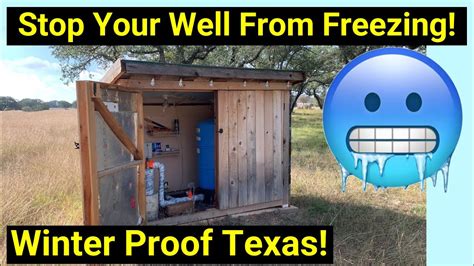How To Prevent Well From Freezing
Ronan Farrow
Apr 01, 2025 · 3 min read

Table of Contents
How to Prevent a Well from Freezing: A Comprehensive Guide
Winter's chill can wreak havoc on your well, leading to frozen pipes and disrupted water supply. Preventing your well from freezing is crucial for maintaining a consistent water source, especially during harsh weather conditions. This comprehensive guide will walk you through effective strategies to safeguard your well and ensure uninterrupted access to water throughout the winter months.
Understanding the Risks of Well Freezing
Before diving into preventative measures, it's vital to understand why wells freeze. Freezing primarily occurs when water within the well casing, pump, or pipes freezes, expanding and potentially causing damage. This damage can range from minor cracks to complete pipe bursts, leaving you without water and facing costly repairs. Several factors influence the risk of freezing:
- Ground Temperature: Colder ground temperatures increase the risk. Shallow wells are particularly vulnerable.
- Pipe Insulation: Inadequate or absent pipe insulation allows for rapid heat loss.
- Water Flow: Stagnant water is more susceptible to freezing than water that's regularly flowing.
- Well Depth and Location: Wells in exposed areas or shallow wells are more prone to freezing.
- Soil Composition: Sandy soil tends to freeze faster than clay soil.
Effective Strategies to Prevent Well Freezing
Protecting your well from freezing requires a multi-pronged approach. Here are some proven strategies:
1. Insulate Your Well Pipes and Pump
Proper insulation is paramount. This includes insulating the well casing, pipes leading to your home, and the pump itself. You can use various insulating materials:
- Pipe Insulation Sleeves: These foam sleeves are easy to install and provide effective insulation.
- Heat Tape: Electric heat tape wrapped around pipes can maintain a safe temperature, even in sub-zero conditions. Ensure it's properly installed and weatherproofed.
- Insulating Blankets: These blankets offer excellent insulation for larger pipes and equipment.
Important Note: When using heat tape, always follow the manufacturer's instructions carefully to avoid fire hazards.
2. Maintain Water Flow
Keeping the water flowing prevents stagnation, which is a major contributor to freezing. Leaving a small, continuous drip from a faucet helps maintain water movement throughout the pipes. This is a simple yet highly effective method.
3. Protect Exposed Pipes
Any pipes exposed to the elements are at high risk of freezing. These could be pipes running above ground or those in uninsulated areas of your home. Consider:
- Insulating exposed pipes: Similar to well pipes, insulate these with foam sleeves or blankets.
- Bringing pipes indoors: If possible, reroute exposed pipes to run inside.
4. Regularly Check Your Well
Conduct regular inspections throughout the winter months. This involves checking for signs of freezing, such as leaks or unusual noises. Early detection can prevent more extensive damage. Listen for unusual gurgling sounds which can indicate ice buildup.
5. Consider a Well Water Heater
In extremely cold climates, installing a well water heater can provide an additional layer of protection. A well water heater keeps the water warm throughout the system preventing ice from forming.
Addressing a Frozen Well
If you suspect your well has frozen, immediately turn off the power to the well pump to prevent damage. Do not attempt to thaw pipes with a flame, use a hairdryer on a low setting or consider using a specialized thawing solution. Contact a qualified well professional for assistance. They have the expertise and equipment to safely thaw and repair any frozen components.
By implementing these strategies, you can significantly reduce the risk of your well freezing and enjoy a reliable water supply throughout the winter. Remember, proactive measures are key to preventing costly repairs and ensuring your comfort during the cold months.
Featured Posts
Also read the following articles
| Article Title | Date |
|---|---|
| How To Keep Moss From Growing Between Pavers | Apr 01, 2025 |
| How To Lubricate Boat Throttle Cable | Apr 01, 2025 |
| How To Make Strawberry Syrup With Strawberry Tops | Apr 01, 2025 |
| How To Paint Furniture Without Brush Marks | Apr 01, 2025 |
| How To Hit A Pen Cart | Apr 01, 2025 |
Latest Posts
Thank you for visiting our website which covers about How To Prevent Well From Freezing . We hope the information provided has been useful to you. Feel free to contact us if you have any questions or need further assistance. See you next time and don't miss to bookmark.
